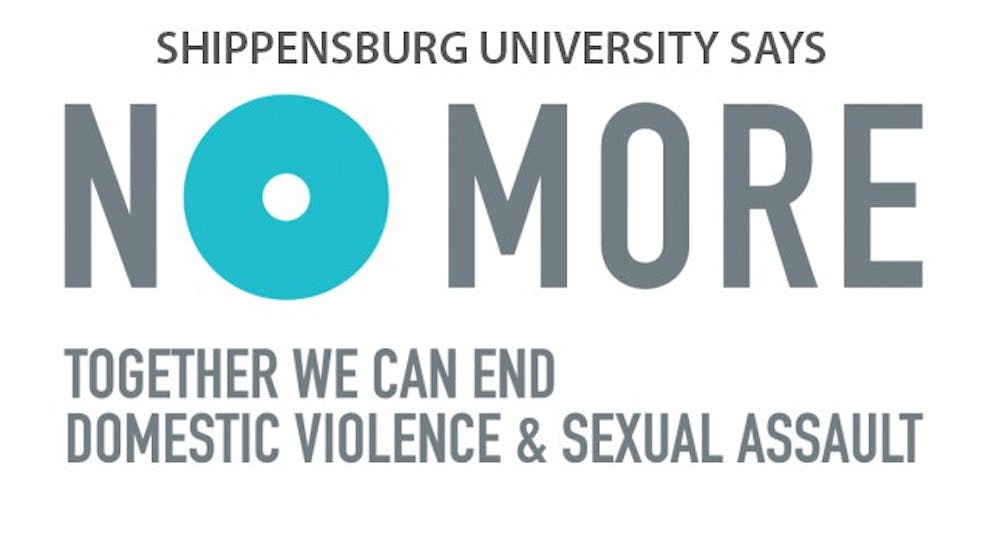Every 109 seconds, another person is sexually assaulted.
That’s about a minute-and-a-half. In that time, you could buy a Raider Bowl from the Ceddia Union Building, print off your research paper in Dauphin Humanities Center or run late to class from Starbucks.
Or you could be sexually assaulted.
Like many colleges across the U.S., Shippensburg University takes steps to prevent these acts from happening, but they still occur. One in five women are survivors of rape, according to nomore.org. Every one out of 10 victims is male, the Rape, Abuse & Incest National Network reports.
SU launched the Ship Says No More campaign in the spring of 2014 in an effort to combat these numbers and put an end to domestic violence and sexual assault. Recently, the university announced that it will receive a $27,000 state grant to build upon the Ship Says No More campaign. The grant is a part of Gov. Tom Wolf’s “It’s On Us PA” campaign.
Looking back, SU administrators and staff have seen an increase in awareness and reporting since 2014, according to Stephanie Erdice, interim director of the Office of Social Equity. An increase in reporting could mean that more acts of misconduct are being committed or more students are comfortable reporting these acts now, Erdice said. When she worked as the director of the Women’s Center, Erdice saw first-hand the impact of the campaign.
They handed out posters, cell phone wallets, cards, pencils — anything someone could use to visibly show their support for the cause. The university developed the No More website, ship.edu/no_more, a one-stop place for students to learn about sexual misconduct and how to report it.
Sexual misconduct is sexual contact or behavior without consent, according to the Ship Says No More website. The definition includes harassment, stalking, voyeurism (peeping), indecent contact, exposing/flashing, intimate partner abuse, molestation, sexual assault and rape.
To promote Ship Says No More, the Women’s Center held photo contests for students to pose with Ship Says No More posters and released a video series to spread the campaign’s message and educate new students at orientation.
“It’s not just the Women’s Center’s responsibility or job,” Erdice said. “We need everyone to do it. We’re part of that team that makes sure that people understand that.”
Janet McKeithan-Janifer, director of student conduct and associate dean of students, developed a conduct board specifically for Title IX cases as part of the campaign. Title IX prohibits the discrimination on the basis of sex, according to ship.edu.
“It really helped us to get the campus informed about reporting instances of sexual misconduct,” McKeithan-Janifer said of Ship Says No More.
McKeithan-Janifer assisted with Ship Says No More training for SU staff and faculty to prepare them to help students who might need their support. In the past, SU offered similar training, but it was more of a passive approach, McKeithan-Janifer said.
“This was a more intentional and personal approach to providing that information and giving people an opportunity to ask questions and have a discussion,” McKeithan-Janifer said.
David Lovett, SU’s Dean of Students, said the university has made great strides in education and prevention since the Ship Says No More campaign launched, but said more can be done.
“I believe that as this trickles down through society and we touch upon more and more of the students coming from high school into the college campus that we will experience even more success with the campaign,” Lovett said.
Both Lovett and McKeithan-Janifer experience the judicial side of Ship Says No More, as they handle cases that stem from reports of sexual misconduct.
While the SU staff and administration have a large role in spreading the “No More” message, Erdice urges students to take on its mission by becoming engaged bystanders.
“It doesn’t have to be a big, grand display of intervention. It can be something very small that changes the course of events,” Erdice said.
By stepping up and taking charge, SU students can be the ones that put a stop to domestic violence and sexual assault.




The Slate welcomes thoughtful discussion on all of our stories, but please keep comments civil and on-topic. Read our full guidelines here.